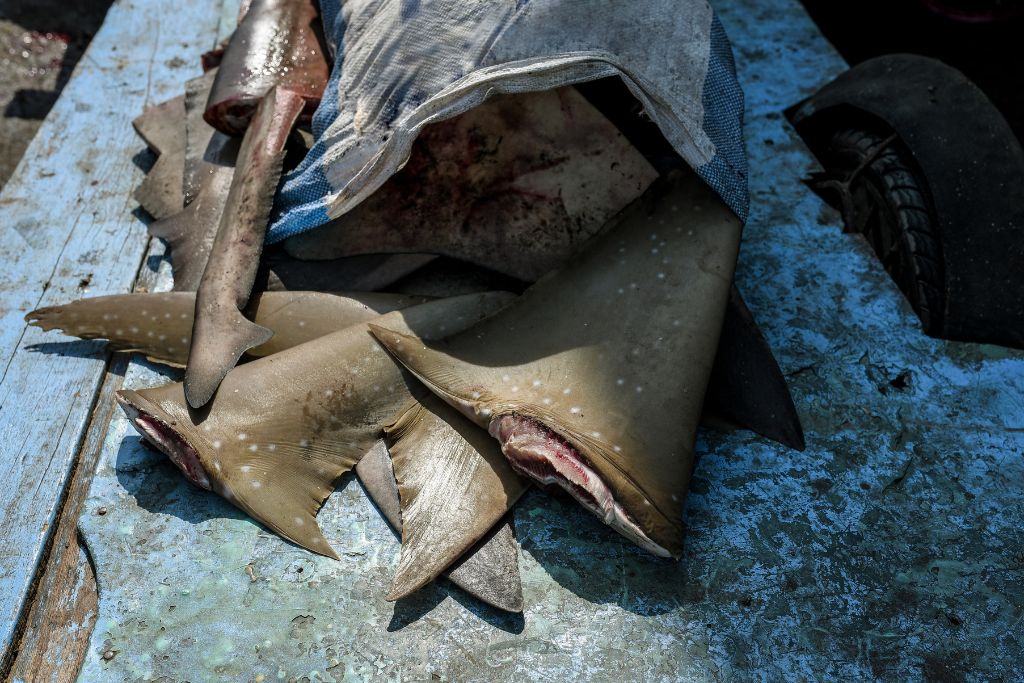Globally, about one-third of all known shark species face extinction and noted shark biologist and author David Shiffman says the biggest threat is unsustainable overfishing. Shark finning, a particularly cruel practice, continues despite actions to halt it, in part, due to illegal criminal trade. According to Greenpeace, the US is the fourth-largest shark exporter of shark meat in the world behind Spain, China, and Portugal.
—
The news about shark fishing is sobering. The National Oceanic and Atmospheric Administration (NOAA) estimates that less than 23% of the 66 shark stocks in US waters are safe from overfishing, while the status of more than half of all shark stocks is not known.
Sharks are fished for their meat and other body parts including their fins. Shark finning is a practice where the fin is sliced off, often while the animal is alive. The shark’s body is then discarded back into the ocean where the animal dies from blood loss and suffocation. Indeed, commercial fishers often opt to keep only the fins as these are the most valuable part of the shark.
Suffocation occurs because many species of sharks need to keep moving in order to breathe. As the shark swims, water passes over its gills, the respiratory organs that function like our lungs. Tiny blood vessels in the gills extract oxygen from the water while carbon dioxide is passed out of the gills.
Shark fins are valued in some places of the world for culinary and medicinal purposes. Fins are an essential ingredient in shark fin soup, a dish considered in Chinese culture as a symbol of status. As Caty Fairclough wrote for the Smithsonian: “Popularity has not faded with time and has even expanded with China’s growing population. Today shark fin soup is still prevalent and has become a staple for more than just emperors on special occasions. As a result, fishermen have a large incentive to gather and sell shark fins.”
You might also like: Hong Kong’s Distressing Role in the Global Shark Finning Trade
In January 2020, a European Citizens’ Initiative ‘Stop Finning – Stop the Trade‘ was registered. This aimed to end the fin trade in the 27 member states that comprise the Union. Shark finning is currently prohibited on board EU vessels and in EU waters. Despite this, as the initiative stated, the European Union “is among the biggest exporters of fins and a major transit hub for the global fin trade.” At the end of the signature collection period in March 2022, the petition had surpassed by more than 202,000, the goal of one million signatures.
On August 2, an Associate Press article implicated the role of the American seafood industry in the shark finning trade. Since 2000, federal law has made it illegal to cut the fins off living sharks. However, individual states may determine that fins from dead sharks may be removed and exported overseas. A recent report by Greenpeace listed the US as the fourth-largest shark exporter in the world behind Spain, China, and Portugal. The country’s regulations on shark finning, therefore, are inconsistent and lead to a misconception that shark finning in the US is illegal.
Criminal activities are supported by a market that pays as much as US$500 a pound for shark fins. As two recent criminal indictments in Florida show, exporters may be falsely labelling cargo bound for China. “Every year, American wildlife inspectors seize thousands of shark fins while in transit to Asia for failing to declare the shipments.” – TCR reports.
Several attempts have been made by US Congress to pass a bill to “make it illegal to possess, buy, sell, or transport shark fins or any product containing shark fins, except for certain dogfish fins”. Penalties would be imposed for violations under the Magnuson-Stevens Fishery Conservation and Management Act. According to the text, the maximum civil penalty for each violation would be “$100,000, or the fair market value of the shark fins involved, whichever is greater.” The legislation, originally introduced in 2017 by a bipartisan group of lawmakers, is once again winding its way through Congress. A 2020 poll found that 77% of all Americans and 79% of all registered voters supported the Shark Fin Sales Elimination Act.
Effective laws and enforcement are lacking worldwide. Without adequate protection for sharks, marine ecosystems and economics suffer. As top predators, sharks maintain a balance in the undersea world. Sharks have played active roles in the marine ecosystem for millions of years, long before dinosaurs existed. Additionally, there are economic consequences for under-regulated shark-finning. By way of example, Ellen Johnson writes in an article for the Mystic Aquarium that in some areas sharks are worth “more alive than dead due to the growing popularity of shark ecotourism.”
You might also like: Shark Liver Oil: The Beauty Industry’s Secret Ingredient


















